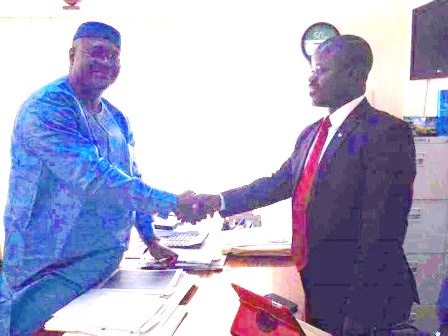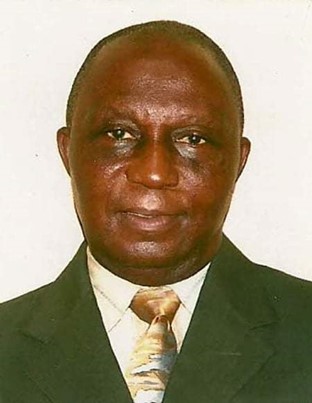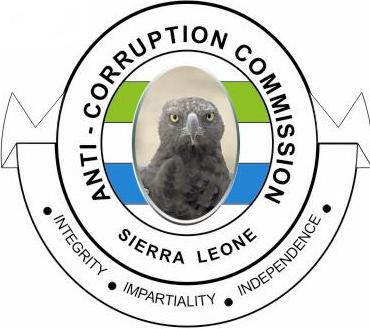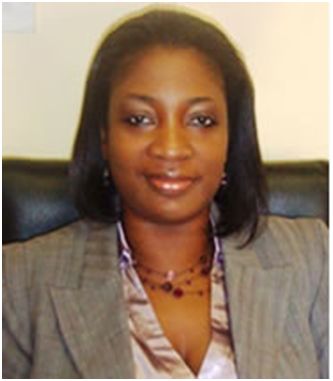Joseph F. Kamara in a “lonelier” job with no “regret”
Sierra Leone’s President, Ernest Bai Koroma was elected in 2007 on the platform of change. This change was clearly captured in his first five years Blueprint for National Development, the Agenda for Change (AfC).
One prominent feature within this document was the President’s commitment to tackle corruption head-on, in a nation inherited with prevalence of corruption and less done in tacking it, amongst other major governance challenges.
Though initiated by him, and an Act on corruption promulgated by his Government, late President Tejan Kabba (h) did very little in making the Anti Corruption Commission (ACC) effectively functional. Some social and political commentators believed, his Government had used the ACC more as a political tool in eliminating perceived opponents even within his Government and party.
The adverse effect was a failure on the part of the then Government to convince Sierra Leoneans about how serious it was, to fight the dreadful cancer that had eaten into the fabric of society.
Just one year in office, President Ernest Bai Koroma in 2008, enacted the strongest legislation in the sub region that gave complete prosecutorial powers to the agency, responsible to fight graft-the ACC.
The decision, many believed made the Government vulnerable. This was even coupled with the establishment of an Open Government Initiative, which today, exposes the Government to public scrutiny, added to the enactment of a law guaranteeing public access to information in late 2013.
This was a novelty on the part of the Government and particularly the President, Dr Ernest Koroma. For him, it was not just about meeting his commitment during his election campaigns, but also a way of fostering the country’s development path.
Since 2008, the ACC, though with a plethora of challenges, has been able to make tremendous progress. This progress could be attributed to the strong commitment provided by His Excellency President Koroma and the astute leadership within the Commission given by the commission’s leadership.
Coming in with high level of legal experience especially in the area of prosecution, having with at the then Special Court for Sierra Leone as Prosecutor, amongst other, Joseph F. Kamara Esq. was, in 2011, appointed by His Excellency President Koroma as Commissioner of ACC. That was following the departure of Commissioner Abdul Tejan-Cole Esq.
Joseph F. Kamara Esq. has been able to move the Commission to its present position and has been receiving laurels for his successes and that of the Commission.
Few weeks ago, following a robust investigation, indictment and prosecution undertaken by the Commission, the ACC was able to secure the conviction of accused persons, working at the country’s generating institution-the National Revenue Authority and a Banking institution for massive fraud.
For the first time in the history of the Commission and country, some of these convicts were jailed on charges of ‘unexplained wealth’ on which they were found culpable.
In this exclusive interview conducted on the 2nd May 2014, and facilitated by Ibrahim Kargbo of the National Anti Corruption Strategy Coordinating Secretariat, Commissioner Joseph Kamara spoke on a range of issues relating to the fight against graft in the country.
JS: First, the Chief anti-corruption crusader was asked to tell how it has been like, serving as Commissioner of the ACC for about three years:
JFK: It has been an interesting and challenging experience .Of course there are always challenges by virtue of the nature of this job but most certainly I’ve enjoyed it amidst the challenges but at this point, we are poised to meet those challenges and ready to move on.
Let us look at the recent NRA/EcoBank landmark verdict that saw the jailing of convicts. You appear as a Commission to have received trillions of commendation from the general public. But how did that happen in terms of your institution being able to secure conviction?
Indeed, it is a landmark case and the judgment has a very symbolic effect for the jurisprudence of the country and the sub region. Clearly, that case is pronounced in the sense that for the first time we have conviction for unexplained wealth and also for the first time we have conviction for public servants failing to disclose to the Commission their assets. And going beyond that, it is part of a recovery process wherein, we are targeting income generating areas for the government and to ensure that the resources of government are protected and safeguarded by the Commission. It was a big and complex case with consequences both for the State and the Commission.
The aspect of unexplained wealth. This is the first time you chasing such Do you intend continuing with that ?
Yes, this is the very first time and it has emboldened our spirit and it was a bold move to have taken in terms of prosecutorial discretion .But being a Prosecutor myself for the past 24 years, I was prepared to take that bold initiative. We are excited that we developed the element and we were able to prove beyond all reasonable doubt that these are charges that can be sustained in court. Moving forward, we have now cast our net wider to ensure that Government resources are protected and that there are consequences for taking charge of Government resources and personalizing them.
Let us look at the approaches you have been using in fighting corruption more so from the framework of the most successful one.
We can say that prevention have been very effective. We do a lot of public education work. We engage radio stations. We are in the media, print electronic firstly for people to understand what is corruption and mostly importantly how does it impact their lives. That is what we are bringing in and now we have seen there is a lot of consciousness .The level of awareness amongst the public about what is corrupt has reached a high crescendo. But definitely we cannot underrate the prosecutorial aspect because we have to investigate and people want to see that there is an effect and there is a punishment for being corrupt. So managing that is a challenge but definitely there has been that two prone approach. We go with public education, systems prevention and prosecution to ensure there is sanction and punishment.
On prosecution, there must be some kind of institutional collaboration between your institution (ACC) and the judicial arm of Government. Has that relations been smooth and strong?
It has been a relationship of a mixed bag because there are times; we believe we have got good support and good judgment. Our cases move on very fast than many other cases. The level of jurisprudence now in terms of corruption cases has heightened within the country. But we also have difficult moment when we have cases that we believe strongly in the quality of evidence that we presented and the court could not accept that. But of course again, we always respect the integrity of the process. Sometimes we take it well, some other times, we feel very disappointed.
Are you suggesting each and every case by your Commission should be won in court?
Well, in law, we always say a Lawyer is as good as his case. When we are not sure about cases, we don’t take them to court. The cases we take to court are those cases where we are 99% sure of success. So when we go to court with all the evidence that we put before the court and it turns out we do not secure conviction, we take it with difficulty because we know the quality of evidence that we presented. But of course, we don’t win all the time.
Sometimes we accept that where things may have gone wrong, we come back to the drawing table and find out where we missed out. Is it on the quality of the indictment or evidence presentation? We do accept when we know there are challenges in some of the cases. We do not appeal when we lose but there are those cases where we think of the law. Even to preserve the state of the law, we should appeal. But I think on a whole, we have a relationship that you may not describe as perfect but one of mutual respect because both institutions are independent and we try to keep that position.
That said about the judiciary, what can you say about the political support from the Executive arm of Government, specifically from the Presidency?
Most certainly, the President has given us the political will. In the entire African landscape, it is only in Sierra Leone where you have a sitting Government Minister charged and convicted in court and it is only in Sierra Leone that you see the kind of laws to fight corruption have been so strengthened to the extent that it makes the Government vulnerable. And we are excited as a Commission and in admiration of the will of the President for us to have the kind of powers that we have .I have never been in position that I have been subjected to any form of compromise, neither have I been summoned or queried for any decision that I have taken .So I have enjoyed that opportunity to be independent t in my work .I have never been in a position where I have regretted decisions that I have taken.
Again, back to the approaches in fighting corruption in relation to your workforce. You win a case based on a strong investigating and prosecuting team and a committed workforce. What can you say about the commission’s workforce?
When I came to the Commission, I met couple of structural challenges in terms of capacity as well. But I can clearly say that I have a very strong management team. You must have noted that it has pleased His Excellency the President, Dr Ernest Bai Koroma, to appoint Sholley Davies a former Director as Deputy Commissioner, showing credence to the fact that there is strength within. In each of the Directorates, we have capable members that have given support to the management that has contributed to the success that we are seeing today in terms of the fight against corruption. And in other aspects of management, I have been able to increase the number of strength of staff from about 121 when I came to 200.
We have strengthened our regional representation; we now have effective regional offices all over the country. We have a Regional Headquarter in Makeni, we have a Regional Headquarter in Bo and in Kenema and we have also appointed District Coordinators. So we have taken the fight to the district level. There are District Coordinators now that are representing the ACC as Focal Points. They participate in NGO issues, they monitor Government Contracts, they monitor Surface Rent issues and then give feedback to the Regional Offices and then down to Freetown. We have also been able to start initiating prosecutions at the regional levels. We have cases ongoing in Bo, Kenema and Makeni so that we take justice to the doorsteps of the people.
Even in terms of Public Education, we have done extremely well despite sometimes the adverse reportage on the fight against corruption. The report on public sensitization has always been positive .But that has not come out in the reports. 99% of respondents’ survey even in the Global Barometer report, the respondents said they now know where to report corruption and they are willing to give support to the fight against corruption.
In terms of Systems Review, we also have that aspect of our work; it is not just a representative of what I would refer to as Prosecutorial Gladiators. No! We go there and look at the systems, we look at what they are doing and how efficient and effective are they. We benchmark them from an Anti Corruption initiative and at the end of the day we have the civil society that gives support and do monitoring and then we prepare reports on what our findings are. Most of these reports have been qualitative and supportive to the work of ministries.
Sierra Leoneans are in appreciation of the ACC’s work, but some are worried, the Act makes provision for lesser fines when people are convicted, thus thinking there is need for review.
The Act is one of the strongest. As a Lawyer, I accept it as it is. It is not perfect but a strong one in any legislation in the fight against corruption. What happens in sentencing is that in the outcome, judges use the most minimal punishment .There is always an opportunity to punish for more and it is satisfactory in that light. But we have been disappointed that when we take cases to court and we secure conviction we get minimal punishment .The problem there is not the Act, it is how it is interpreted by the court. There are other aspects of the Act which we will wish to see some amendment but am not in a rush for that. There are lots of things we have not finished yet to fulfill under the mandate of the Act. More particularly we are interested in trying to enhance and strengthen our work in the Private Sector-corruption in the Private Sector which has not been so much covered in the Act. We are moving towards that, we are taking it at a stage now wherein we are creating the awareness of corruption in the Private Sector.
Are there pending indictments, say in the coming days, moths or weeks?
We do have cases in the court, right onto the Supreme Court. For us at the Commission, each case is big but there is always a heighten public interest in political profile cases. But there is no high political profile case, currently. But definitely people tend to misunderstand that a high profile political case is when a Minister is involved. There are times when it is not a Minister but someone with high political connection. In terms of investigation and indictments, yes, we have very big cases that are currently under investigation and with high profile individuals.
Any names?
I would not disclose names at the moment .Yesterday(1/5/2014) we were here till 11 pm reviewing indictments and I am sure within the coming weeks, we will release a few more indictments. Yes, we are progressing with work with a lot of investigations going on but it is not every investigation you link to a high profile case. There is a general belief that it is the politicians that are corrupt but my experience that I have come to have is that corrupt is not limited to politicians. In fact it is established within the Public Sector force and that is my major challenge. That is why we are developing a new strategy that we go into the Public Sector proper and see how we can mainstream anti corruption initiative into that workforce.
Has this job given you more friends, or you today find yourself in an isolated job?
This job like many others, the top is always lonely. It is lonelier in this particularly job because you’ve got to investigate friends and Sierra Leone being a small country, you create enemies in the process especially if you are a bold Commissioner that takes bold decisions. You step on people’s toes. But it is not something I regret because my commitment to the country comes first.
It has been a pleasure talk to you.
Thank you Baimba.
Stay with Sierra Express Media, for your trusted place in news!
© 2014, https:. All rights reserved.







